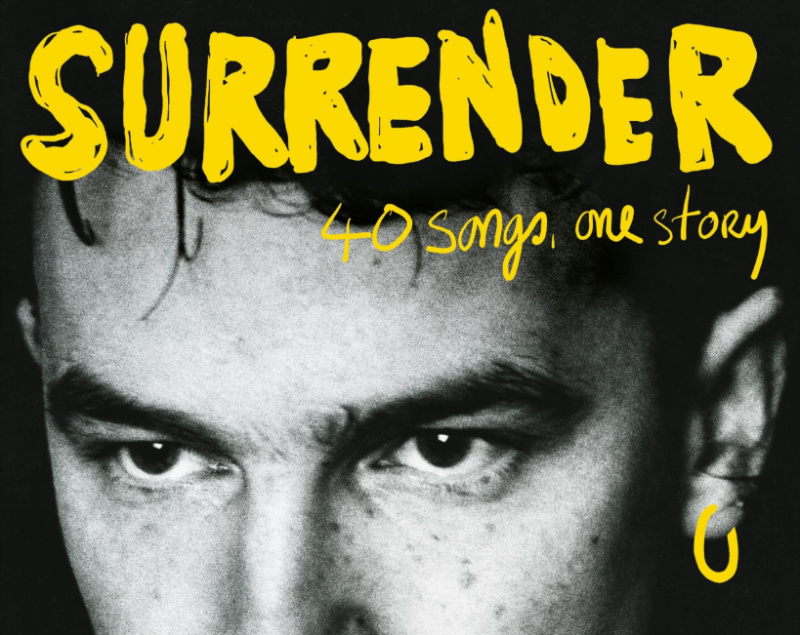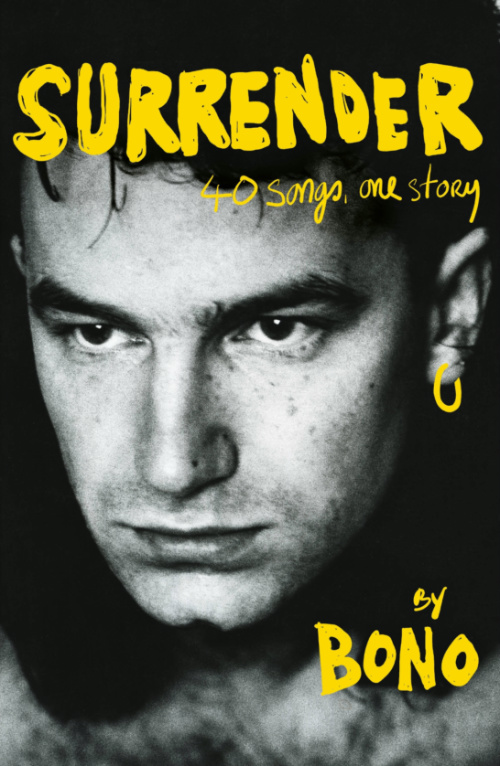
NILS VON KALM reads Bono’s autobiography, ‘Surrender’…
Bono
Surrender: 40 Songs, One Story
Hutchinson Heinemann, 2022
ISBN-13: 978-1529151787

“I would highly recommend the audio version. It is narrated by Bono himself. An autobiography like this, especially about such a charismatic personality, needs to be read by its author. Otherwise you just don’t get the charisma of the person coming through. The tone of voice, the accentuations, are what makes this such a fascinating listen.”
Even if you’re not a fan of Bono or of U2, I would encourage anyone to read his autobiography, Surrender: 40 Songs, One Story.
As the lead singer of U2 says, he wrote this story to tell his family and friends what he’s been doing with his life. And what a life it has been. And is. This is a fascinating memoir of a fascinating human being. This is a guy who read Dostoevsky’s Crime and Punishment as an 18-year-old! In three weeks!
If you’re going to buy this book, I would highly recommend the audio version. It is narrated by Bono himself. An autobiography like this, especially about such a charismatic personality, needs to be read by its author. Otherwise you just don’t get the charisma of the person coming through. The tone of voice, the accentuations, are what makes this such a fascinating listen.
As Bono reads, music from the songs he mentions intertwine his narration. As such, the book is an insight into his soul, the soul of a deeply feeling person (I wasn’t surprised to find out that he’s a Type 6 on the Enneagram).
Throughout this story, Bono takes us deep into his life, what it feels and felt like. This is a story not just of one remarkable individual; it is the story of a movement, a movement called U2. I have been a fan of the band for almost 40 years, and I see U2 as more than just a band. In the ‘80s they were described as a beacon of hope amidst the mediocrity of much music then. My view hasn’t changed.
While their music has changed and evolved over the years, the spirit behind it hasn’t. I believe that spirit comes mainly from their deep faith. And it is deep. Early in the book, Bono describes how they always pray before they go on stage for another concert. They pray that they will be useful. And wow, haven’t those prayers been answered for millions of people the world over for the last 40 or so years?
Each chapter in the book is dedicated to a U2 song, which in turn becomes a descriptor for the album that song appeared on. One such chapter describes the release of Songs Of Innocence (which caused a furore among many due to its automatic release on iTunes) in 2014. The release of that album was an emotional time for Bono. He speaks about the rawness he still felt about the passing of his mother about 40 years earlier.
Just days before the album’s release, Bono seriously considered pulling the song, Iris (a song to his mother) from the album, but it was too late. Apple had their deadlines. The reason he wanted to pull the song was because of the strong emotions it triggered in him. He couldn’t understand why he still felt so raw about his mother after all these years. After contacting a few family members, he suddenly realised. The date of the album’s release, 9th September, was the anniversary of the last time he spoke to his mother. Suddenly the song had new meaning for him, and it seemed right that it was on the album.
As I was listening to Bono read, it didn’t take long to realise that this is someone who comes across very in touch with himself, who seems to have done the work on himself that we all need to do to be the people we need and really want to be. Despite his much-publicised ego, this is a man who comes across deeply aware of his own flaws, and therefore deeply humble.
This is also a story of hardship, something which might sound strange for one of the most famous people on the planet. But the story of his mother’s passing, and the terrorist bombing of 17th May, 1974, which, if it wasn’t for a bus strike, would probably have meant that the world would never have seen U2, are traumas which shaped the young Bono. On the day and time of that bombing, Bono and his best mate would normally have been at a record store where one of the bombs went off. Maybe it was Providence that meant they weren’t there that day.
The band’s Christian influence also pervades this story all the way through. From their beginnings, they agonised over whether they should even be in a rock band as it was Christians who were the most unfavourable about their initial success following their early US tours. They were playing “the devil’s music” apparently (this was the 1980s, don’t forget). But it was Bono’s rage, which was to be channelled into a rage against global poverty, and inspired by the Old Testament prophets and, of course, by Jesus himself that has made this band unique.
It might not be known to many people that there was a time in the early 80s when Edge, the guitarist, actually quit the band, such was the seriousness with which he took his faith and what he thought his and the band’s calling was. When the others said they didn’t want to continue as U2 without Edge, they went to their manager, Paul McGuinness to tell him. And so it was that McGuinness, an atheist/agnostic, eventually convinced them to continue because “what type of ‘God’ would want them to break the law by reneging on their contractual obligations?!”.
They eventually decided that they wanted to be in the world but not of it, but not be a ‘Christian’ band. Probably one of the most profound insights in the whole book is when Bono describes this time as them learning to become comfortable with paradox and that you didn’t need to be compelled to resolve every contradictory impulse.
We rely on our readers to fund Sight's work - become a financial supporter today!
For more information, head to our Subscriber's page.
Being a celebrity, Bono has met just about anyone who is anyone in the celebrity world. One story he recounts is from when Mikhael Gorbachev stopped by their home one Sunday and they engaged in a thoroughly stimulating conversation about his leadership of the former Soviet Union in its dying days. Many other such stories are regaled with side-splitting humour and humility.
Throughout the book, Bono addresses some of the controversies that have beset the band over the years, namely the apparent tax dodging and the aforementioned free release of the Songs of Innocence album on iTunes. I won’t give away what he says, except to say that his explanations of both occurrences come across as honest reflections.
As well as being the front person of one of the biggest bands in the world, Bono is also of course known for his activism on behalf of the world’s poorest people. It started when he and his wife, Ali, visited Ethiopia in 1984. It then continued with the famous LiveAid set in 1985, touring with other artists for Amnesty International in 1987, and then the tireless campaigning with Presidents and billionaires to allow Africans to afford drugs to restrict the onset of AIDS.
The fact is that, if it wasn’t for Bono, millions more lives would have been lost to AIDS and other preventable diseases over the last couple of decades. As he says in one of his songs, “where you live should not decide whether you live or whether you die”. Indeed. Bono has said he wants to use his fame as currency, and he is spending up big time. It is inspirational to read about.
I recently listened to a podcast episode of Brene Brown interviewing Bono about Surrender. She describes the book as a love letter to Ali, to God, and to the numerous people who have influenced him over his life. His love for Ali and his family comes through very strongly all the way through. He is smitten with her, like a young teenager. Married for 40 years, theirs is one of those rare marriages that has survived the lures and the siren calls of the rock ‘n’ roll lifestyle.
Surrender is a fascinating read or listen, even if you are not a U2 fan. It is the story of one man’s search for reality, a search that has taken him on the road and to locations that most of us can only dream of. Whatever you think of Bono (and many views of him are quite extreme), he has done more good in his life than most of us will ever do. His faith continues to propel him, to energise him, and to guide him. He talks about it any time he gets the opportunity, and that is a lot.
Many years ago, when he wrote the forward to Australian preacher, John Smith’s autobiography, On the Side of the Angels , Bono said that on the back of John Smith’s Harley, there was more action that in most places. If someone had written a foreword to Surrender, the same thing could have been said of Bono. A man of action, as well as of words, his story is one for the ages.
This article contains an affiliate link.






